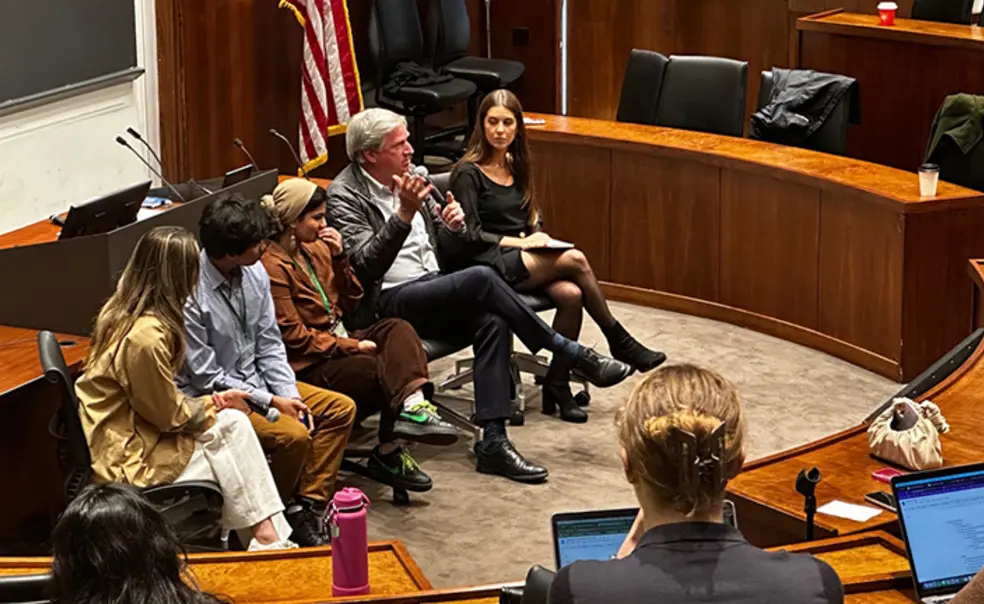Student Conservation Society Brings Global Youth Activists to Princeton
The summit brought together bigger countries that have more resources and smaller countries that have more public support for change
About 55 youth activists, environmentalists, and researchers working to combat climate change gathered at Princeton University in early April for the inaugural Youth Climate & Conservation Summit, organized by the Princeton Conservation Society (PCS).
Much of the conference, which was held April 6-8, consisted of 15-20-minute presentations by international youth activists — from places such as Pakistan, the Philippines, Argentina, Morocco, and the Democratic Republic of Congo — who spoke about climate-focused initiatives and projects in their homelands.
“We’re all learning from each other,” summit organizer Michael Salama ’24 told PAW. “We’re just trying to put as many perspectives together as possible, because we think that’s how those connections are going to be made, [and] how we’re going to try and build toward more unified international activism among young people, and among non-young people as well.”
Salama is the president of PCS, a student-run organization that promotes environmental education and provides opportunities to contribute to climate and conservation advocacy efforts, according to its website.
Salama came up with the idea for the conference last year to bring together bigger countries — such as the United States — which have more resources to combat climate change, and smaller countries, which have more public support and momentum for change.
“I do believe it’s the biggest issue of our time, so whether we want to or not, we’re going to have to do something about it as a collective,” said Renata Koch Alvarenga, a master in public policy candidate at Harvard and founder of EmpoderaClima, an educational platform on climate for youth in Brazil.
“The climate crisis is a global crisis,” said Ayisha Saddiqa, an activist from Pakistan who co-founded both Polluters Out, a coalition working to expel fossil fuel companies from society, and Fossil Free University, a training program for those interested in climate justice activism.
The summit also hosted several panels, including one specifically for Spanish speakers, on climate finance and land use. One theme that emerged was the importance of representation when determining climate solutions.
“We can’t fight climate change with only 50% of the population,” said Koch Alvarenga, who encouraged the inclusion of more women and Indigenous people in delegations to large international climate conferences such as the United Nations’ annual Conference of the Parties (COP).
Another theme that several speakers touched upon was the idea of turning to nature for solutions. Cristián Samper, former president and CEO of the Wildlife Conservation Society and currently a managing director and leader at the Bezos Earth Fund, agreed that nature will be crucial to solving the crisis; the Bezos Earth Fund is aiming to protect and conserve 30% of the planet’s land and marine areas by 2030, according to its website.
Saddiqa stressed that “nature is being lost every single day,” and that once that biodiversity is gone, “you cannot get it back.”
The keynote event was an advanced screening of Wild Life, a documentary film that tells the story of the late Doug Tompkins, founder of The North Face, and his wife, Kristine “Kris” Tompkins, former CEO of Patagonia. The couple co-founded Tompkins Conservation and worked to conserve land in South America, eventually donating about a million acres of preserved land back to Chile and, through instrumental partnerships with the Chilean government, helping to preserve an additional 9 million acres for national parks.
Kris Tompkins, who is president of Tompkins Conservation, recorded a special video message that was played ahead of the film in which she congratulated attendees on the summit and encouraged them to continue their efforts, saying she hasn’t seen this level of youth activism since the ’60s and ’70s.
The screening was followed by a Q&A with Elizabeth Chai Vasarhelyi ’00, who co-directed the movie with her husband, Jimmy Chin. The pair are most well-known for their 2018 climbing film Free Solo, which won the Academy Award for best documentary feature. The discussion was moderated by Denise Xu, a Princeton Ph.D. candidate in the Department of English and the Interdisciplinary Doctoral Program in the Humanities.
When Xu asked Chai Vasarhelyi how she balances feelings of hope and terror when it comes to climate change, the director answered: “This is the existential, but also physical, crisis of our time, and there is hope because we can change something. And that’s the point. It’s just very simple … if you believe in something, you can do something.”










No responses yet